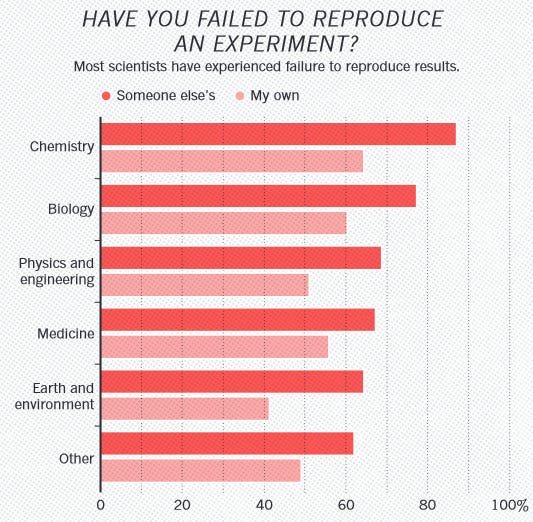Science Fact or Fictional Science
Academia's research integrity is under severe threat by the replication crisis
Thank you for reading Lithium Horizons. Here we explore energy, innovation, and ideas from the frontiers of materials. You can subscribe for free to receive new posts directly in your inbox.
”The truth is, there is nothing—there is nothing—of the same order of magnitude as the accomplishments of the invention of quantum mechanics or of the double helix or of relativity. Just nothing like that has happened in the last few decades.”
― John Horgan, The End of Science
Despite the vast volume of scientific literature, a troubling reality looms: many published findings cannot be replicated. According to Nature, over 70% of researchers have attempted and failed to reproduce their peers' experiments, with over half experiencing similar setbacks with their own work.
The failure to replicate scientific results doesn't always stem from fraud; more often, it's a consequence of dwindling standards and biases, exacerbated by the publish-or-perish culture. The relentless pressure to publish, coupled with the emphasis on quantity over quality, has led to the proliferation of paper mills churning out fake articles with fabricated data.
Consider Einstein, who revolutionized physics with just four papers in 1905,1 each groundbreaking in its own right. Nobel laureate Peter Higgs suggests he wouldn't thrive in today's academic environment, where the demand for productivity drives scholars to churn out dozens of papers annually. Compare that to today’s university professors who publish dozens of papers a year. How is that even possible while maintaining the necessary rigor? It turns out that it is not possible. Just scroll through Retraction Watch to understand the magnitude of the problem.

What is surprising, however, is that less than 31% of respondents recognize this as a problem. There are also those who argue to the contrary and claim that these discussions are counterproductive, fearing they'll undermine public trust in science—a ship that has long sailed. The focus on quantity over quality not only hampers scientific progress but also stifles breakthroughs by drowning them in a sea of mediocrity. Most of the scientific papers published today bring little new to the table. In turn, this noise drowns papers with important breakthroughs that cannot garner field-wide attention through gradual processes of diffusion. The signal-to-noise ratio is too low. It’s a perfect storm to maintain a stagnating status quo.
So, what is the solution?
We must acknowledge that technological progress isn't guaranteed; knowledge can erode, and technology can degrade. To forge ahead, we must continue building upon centuries of accumulated knowledge by:
Removing incentives for quantity
Increasing incentives for quality
Scientific advancement resembles mapping an uncharted continent: researchers navigate hypotheses, most of which will prove false. Yet, by sharing findings, they converge on correct hypotheses, often serendipitously. This is precisely why the replication crisis is so concerning; fake results misdirect research efforts. It's imperative to publish failures alongside successes as beacons guiding others away from pitfalls and toward genuine insights. Perhaps, by fully grasping the importance and consequences of their work, scientists may naturally gravitate toward higher standards of quality.
That’s all for now. Until next time 🔋!
Thank you for reading this article, I hope you enjoyed it! Feel free to share it with your friends.
Because of the importance of the these papers, 1905 was dubbed Annus Mirabilis, Latin for ‘‘year of extremely good events‘‘.



